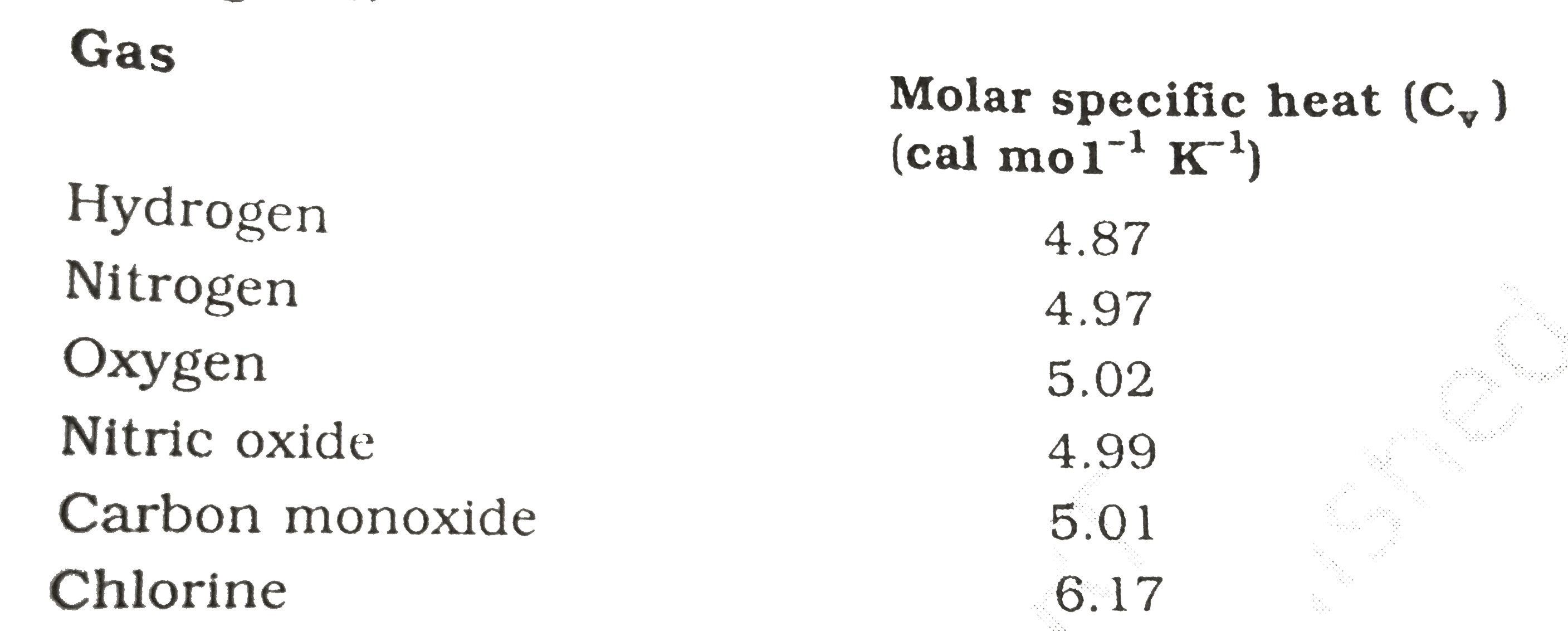Given below are observations on molar specific heats at room temperature of some common gases

The measured molar specific heats of these gases are markedly different from those for monatomic gases. Typically, molar specific heat of a monatomic gas is 2.92 cal/mol K. Explain this difference. What can you infer from the somewhat larger (than the rest) value for chlorine ?
Video Solution
Text Solution
The gases listed in the given table are diatomic. Besides the translational degree of freedom, they have other degrees of freedom (modes of motion).
Heat must be supplied to increase the temperature of these gases. This increases the average energy of all the modes of motion. Hence, the molar specific heat of diatomic gases is more than that of monatomic gases.
If only rotational mode of motion is considered, then the molar specific
heat of a diatomic
With the exception of chlorine, all the observations in the given table
agree with.This is because at room temperature, chlorine also has vibrational modes of motion besides rotational and translational modes of motion.
|
Topper's Solved these Questions
- THERMAL PROPERTIES OF MATTERBook:NCERTChapter:THERMAL PROPERTIES OF MATTERExercise:EXERCISE
Explore 22 Videos
- SYSTEMS OF PARTICLES AND ROTATIONAL MOTIONBook:NCERTChapter:SYSTEMS OF PARTICLES AND ROTATIONAL MOTIONExercise:EXERCISE
Explore 33 Videos
- THERMODYNAMICSBook:NCERTChapter:THERMODYNAMICSExercise:EXERCISE
Explore 10 Videos
Similar Questions
Knowledge Check
At constant volume, for different diatomic gases, the molar specific heat
Ais same and 3 cal/mol∘C approximatelyBis same and its value is 4 cal/mol∘C.Cwill be totally differentDare approximately equal and its value is 5 cal/mol∘COne mole of a monatomic gas is mixed with 3 moles of a diatomic gas. What is the molar specific heat of the mixture at constant volume?
A54RB94RC34RDROne mole of mono atomic gas is mixed with 2 moles of diatomic gas. What is the value of molecular specific heat of the gas at constant prssure in cal/mol K? (R=2 cal/mol K)
A1.5B6.32C3.5D4.16
Explain what is meant by specific heat of a substance. What are its units? How is molar specific heat different from specific heat?
View SolutionNear the room temperature the molar specific heat at constant volume is equal to ________ J mol−1 K−1.
View SolutionThe molar specific heat of a gas at constant volume is 12307.69 J kg−1K−1. If the ratio of the two specific heats is 1.65, calculate the difference between the two molar specific heats of gas.
View SolutionThe molar specific heat of a gas at constant volume is 24 J/mol K. then change in its internal energy if one mole of such gas is heated at constant from 10∘C to 30∘C is
View SolutionThe molar specific heat of a gas at constant volume is 20 Joule mol−1K−1. The value of γ for it will be
View Solution
